Notes: This is an adaptation of an earlier post, Save the Children. Thank you to C-A-L-F and Evolve! Campaigns for allowing the sharing of pictures.
A Mother’s Story
Chloe had been happily anticipating the birth of her new baby. She carried her baby inside her for nine long months. They were one, mother and child. It had been a difficult pregnancy, as Chloe did not live in optimal conditions. Her home was small and crowded and she did not have a lot of room to move around. Chloe did not have access to the best prenatal care and her diet was far from nutritious, both for her and for her unborn child. Her stress level was high, made even worse by the fact that Chloe had been raped, resulting in her current pregnancy. Still, Chloe loved her baby and eagerly awaited its arrival. The birth was difficult but Chloe gave birth to a beautiful baby boy. She fell in love with him at first sight, her maternal instincts automatically kicking in. Chloe would love her little boy, protect him, nurture him and help him grow big and strong.
But before Chloe even got to feed her son, he was gone. Abducted. Chloe searched frantically for her baby but could not find him anywhere. She cried so hard and so loud, it could be heard for miles. Chloe cried and called for her son all day and all through the night but he was nowhere to be found. She refused to eat or drink anything; all she could think about was her son. Where was he? Was he safe? He was just a baby. He needed his mother. Refusing to give up, Chloe continued to search for her son, looking again and again in the place where she had last seen him. She sobbed and bellowed, remembering her sweet boy’s face, the smell of his infant body, the feel of his skin.
After many days and nights of searching, calling and crying, Chloe fell into a deep despair. She withdrew and did not socialize with others. She still refused to eat or drink. She grieved alone and no one would help her. No one cared.
Chloe did not know that her newborn son had been abducted and was being held in a cage so small he could not turn around. Shackled by his neck, her baby could not even lay down comfortably. Never tasting his own mother’s milk, he was fed only a thin liquid that contained no nutrients and he soon became iron-deficient. He cried and called for his mother but she never came. Within a few months’ time, Chloe’s baby was murdered. She never found out what happened to him, never saw him again and her own painful death followed shortly after. Chloe was only about 4 years old herself.
This sad story is what happens to over 9 million cows each year. They are repeatedly forcibly impregnated and have their babies stolen from them, stripping from them their rights to be mothers to their children. Cows grieve strongly. Research has shown that the removal of a calf is the worst thing that can happen to a cow.
In his book, “An Anthropologist on Mars: Seven Paradoxical Tales,” neuropsychiatrist Oliver Sacks tells the story of his visit to a dairy farm with Colorado State University Professor of Animal Science, Temple Grandin. Hearing the cries of these grieving mothers and babies, Temple Grandin said, “That’s one sad, unhappy cow. She wants her baby. Bellowing for it, hunting for it. She’ll forget for a while, and then start again. It’s like grieving, mourning – not much written about it. People don’t like to allow them thoughts or feelings.”
One person who has written about the mother-child relationship in animals is Jeffrey Moussaieff Masson. In his books “The Pig Who Sang to the Moon: The Emotional World of Farm Animals” and “The Face on Your Plate: The Truth about Food,” Masson explores the strong bond between mother and baby and the devastation that occurs when it is broken.
Beautifully written, with passages from Shakespeare to the Torah, Masson’s books are among my favorites. He is one of the few authors who has studied the process of denial in humans.
How is it that humans do not see the torture inflicted upon these animals, these mothers and babies? How do people eat veal, knowing it is a baby calf? Or suckling pig? Infants suckle. How is that connection not made? Or is it made and then repressed?
Another author who writes about the mother-child bond in animals is Amy Hatkoff. Hatkoff is a child and family advocate, parenting educator, author and filmmaker. In her book, “The Inner World of Farm Animals: Their Amazing Social, Emotional and Intellectual Capacities,” Hatkoff “challenges us all to reconsider the way we think about and treat farm animals. Combining the latest research with touching stories and beautiful photographs, the book makes a plea for treating these beings with compassion and respect.” This is one of the most beautiful books I have ever read.
Evolutionary theory says that humans are hardwired to attach to babies in order to ensure their protection and their survival. Certainly, most people will smile and say “aww” when they see pictures of babies, both human and non-human. Not everyone is enamored by chickens but most people think little yellow baby chicks are cute. Baby pigs, puppies, kittens, tiny baby birds – we think they are adorable. We buy our children stuffed animals that look like them, we love to look at pictures of them, and then we torture, murder and eat them? We tear a baby from its mother, slaughter them both and then feed them to our own children under the guise of loving parenting? Something is wrong with this.
Animals used for food do not get to live out their lives to their natural life span.
Broiler chickens can live 2-5 years but are killed at 6 weeks for their meat. Egg-laying hens have an average life span of 10-12 years but when they are spent and can no longer produce a profitable number of eggs, they are sent to slaughter. Most don’t get to live even two years. Their babies also suffer tragic fates.
Male chicks are useless to the egg industry and are killed, often on the very day they are born, by being thrown away in garbage bags or thrown into wood chippers while still alive. Again, mothers and their babies are torn apart, tortured and slaughtered.
Pigs have a natural life span of 10-15 years but are turned into ham, bacon and sausage by 6 months of age. People eat “suckling” pigs because they are more tender. Think about that, hear the word – “suckling.” Literally, babies who are still breast-feeding. That is who gets ripped away from their mothers in order to become someone’s expensive dinner.
A cow used for beef could live up to 25 years but is slaughtered before it reaches 2 years old. Dairy cows are kept in a constant state of pregnancy. When their calves are only 2 months old, they are artifically inseminated to impregnante them again. Don’t think they get to mate with a bull. They are put on “rape racks” and have farm workers’ arms shoved up inside of them to release the semen taken from the bulls. They are pregnant so often they get painful infections such as mastitis.
Dairy cows get to “live” until they are spent and can no longer produce profitable quantities of milk and are then killed by 4 years old. Their babies marked for veal only get to live a few months at most. They spend those few months penned up in an crate where they can’t even turn around. That “milk-fed” white veal in the supermarket comes from the anemia of a baby calf who was fed a watery solution, not their own mother’s milk.
One organization, Liberation BC in Vancouver, has a cow ribbon campaign dedicated to raising awareness of the plight of non-human mothers, mothers who are used in the food industry. Visit their web site, http://www.cowribbon.com/, where you can send free e-cards for Mother’s Day, get your own cow ribbon for $5 (I wear mine everyday), get photos you can use on Facebook and Twitter, learn more about happens to farmed animals and find out ways you can help.
On Mother’s Day, we are supposed to honor our mothers. Why do we not honor ALL mothers, human and non-human? All mothers want to keep, love and care for their babies. All mothers deserve that chance.
Mother’s Day is a wonderful day to rid our lives of any products that dishonor the mother-child bond. We don’t need dairy products, we don’t need eggs, we don’t need leather, suede or fur, we don’t need animal products at all. What we need is to live lives of compassion. We need to live a Vegan life – a life that is all about life, not death.
“Motherhood is priced; Of God, at price no man may dare to lessen or misunderstand.” – Helen Hunt Jackson

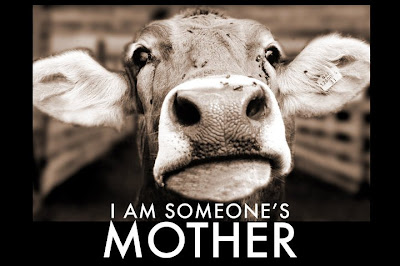

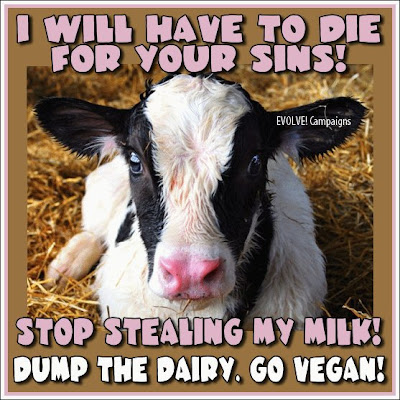
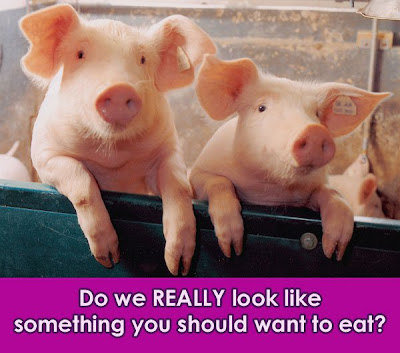

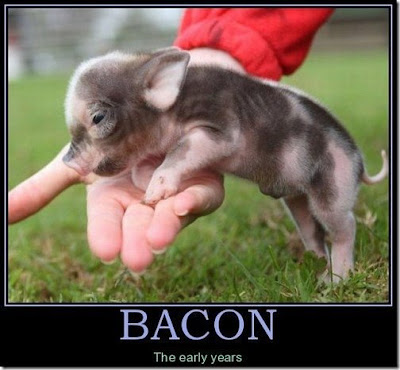
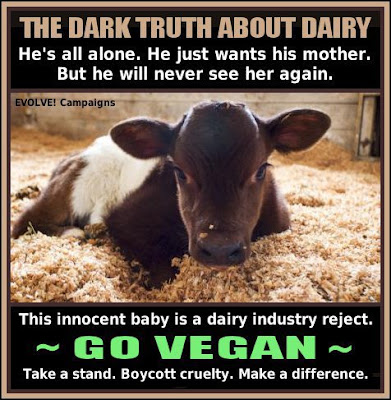


Hi Lana, nice to meet you. I lost about 50 or so pounds before I went veg. Than I lost some more but it really came off when I went vegan. Then some more when I went gluten free.
I will check out your blog 🙂
Just discovered your blog. I am a vegetarian in the process of going vegan. You go, girl. I also live in New York on Long Island. Congrats on the weight loss, too. Was that a result of becoming vegan? I will be visiting you often. Come visit me. Lana http://www.lifeatwildberrycottage.com
Thank you 🙂
How is it that humans do not see the torture inflicted upon these animals, these mothers and babies? How do people eat veal, knowing it is a baby calf? Or suckling pig? Infants suckle. How is that connection not made? Or is it made and then repressed?
Yep, I don’t understand it either. Great post!
Another example of your beautiful writing, Sweetie. You get right to the heart of everything, always.